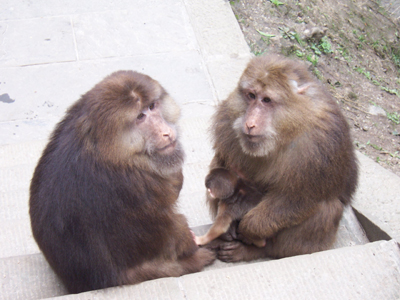| Home / Environment / Public Endeavor | Tools: Save | Print | E-mail | Most Read |
| Successful Diet for Mountain Monkeys |
| Adjust font size: |
Over 200 chubby Tibetan macaque monkeys on the
The monkeys, under second-level state protection, used to live a decadent life in the 80-hectare ecological reserve in the Amid fears that the monkeys were losing their wild instincts and becoming obese, zoologists launched the slim-fast plan. Hu Yongzhong, director of the monkey protection reserve, said, "The macaques became used to asking for food from the tourists. Half of their food came from eating wild plants they found for themselves the other half came from the tourists." The tourists were feeding the monkeys unlimited fatty snacks which made them fat and resulted in high blood pressure and high lipid content in their blood, according to Hu. "A normal adult macaque weighs some 25 kilograms but many ballooned to With the macaques growing more sluggish and lazy and in danger of losing their wild instinct, staff on “The aim of the slimming plan was to control the diet of the macaques," said Jian Hongbo, deputy director of Qingyinge administrative office with the Emei Mountain Administrative Committee. "We told tourists that they could only feed them with food approved by experts such as raw pignuts, corn and raisins. At the beginning many tourists could not understand us. One elderly American lady complained that she’d brought the food all the way from her home." The zoo staff also imposed a limit on the amount of contact time the macaques had with tourists. When their time was up, the staff would drive the macaques into the mountain forest. "This urged the macaques to find food by themselves in the wild and reduced the effect of human nature on them," Jian said. "To maintain their wild instincts, we never feed them. They find their own food in the wild." The Tibetan macaque, also known as Milne-Edwards' Macaque, is an endangered species believed to be unique to They live in high mountains or forests in groups. There are large groups of Tibetan macaques in Emei Mountain of Sichuan and (Xinhua News Agency |
| Tools: Save | Print | E-mail | Most Read |
 |
| Related Stories |
|
|||
